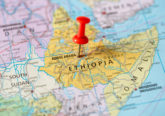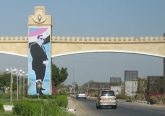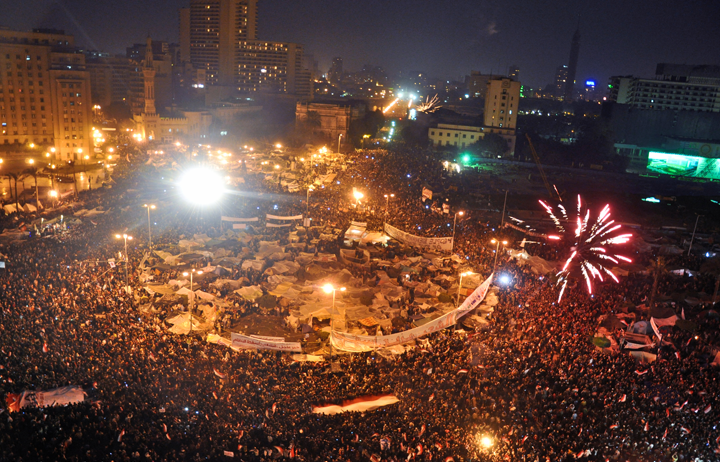 Having toppled a dictator of thirty years in the uprisings of January and February 2011, millions of Egyptians looked ahead to a future of comprehensive change. In May 2012, they faced the disturbing prospect of choosing a new president from a list that included Mubarak’s last prime minister, and foreign minister. When the former, Ahmad Shafik, was allowed to pass through to the second electoral round, waves of nationwide protest decried his candidacy. Yesterday, to the alarm of pro-revolution political forces, the High Constitutional Court dissolved parliament, and legislative powers passed to the ruling military council. Several prominent activists have slammed the entire transitional process, and have been protesting with fellow Egyptians to boycott a poll they dismiss as illegitimate and ridden with violations.
Having toppled a dictator of thirty years in the uprisings of January and February 2011, millions of Egyptians looked ahead to a future of comprehensive change. In May 2012, they faced the disturbing prospect of choosing a new president from a list that included Mubarak’s last prime minister, and foreign minister. When the former, Ahmad Shafik, was allowed to pass through to the second electoral round, waves of nationwide protest decried his candidacy. Yesterday, to the alarm of pro-revolution political forces, the High Constitutional Court dissolved parliament, and legislative powers passed to the ruling military council. Several prominent activists have slammed the entire transitional process, and have been protesting with fellow Egyptians to boycott a poll they dismiss as illegitimate and ridden with violations.
It was against this backdrop of tumult and defiance that the international conference entitled The Egyptian Revolution, One Year On: Causes, Characteristics and Fortunes began at the Department of Politics and International Relations, Oxford University, over 18-19 May 2012. It was co-sponsored by the Department and the John Fell OUP Research Fund at Oxford University, with the generous contribution of the Middle East Centre at St Antony’s College. Links to the programme, abstracts, and conference sessions’ recordings are available at the conference website.
About a year in the making, the conference had been based on a Call for Papers that aimed to reflect rather than restrict, offering several diverse areas of potential enquiry. The intention was to occasion a ‘first anniversary history’ of a broad and interdisciplinary nature. The themes that emerged ranged over the preludes to Egypt’s January Revolution; its movements and mobilisation; revolutionaries’ art and sense of humour; the impact it had on law and the state; negotiations of public space; and repercussions on the international scene.
The conference stressed the value of examining a revolution in progress, and of scrutinising history as it unfolded. This was to reflect the responsibility of social scientists towards the peoples they study, and towards the budding revolution occasioned in the academic field since 2011. Looking specifically at Egypt, the conference was grounded in an understanding of the fortunes of the Egyptian revolution as critical for the other Arab uprisings, and a desire to burrow deep into the Egyptian case rather than offer macro-themes seemingly relevant across the region. The conference was held as a departmental event to affirm the importance of locating the political processes unfolding in Egypt within a context of comparative politics scholarship, while embracing the expertise and empirical rigour of area studies specialists.
The first panel, on the Preludes and Explanations of the revolution, sought to understand the outbreak of the first uprising of 25 January 2011 and to place it in the historical context of decades of anti-regime popular mobilisation in Egypt. Speaking on the labour movement, Marie Duboc stressed the way in which disparate struggles forged empowering connections, in strikes and protests between 2004 and 2010. Amr Osman compared debates amongst Egyptian intellectuals, pointing to the erosion of the legitimacy of the 1952 Revolution under presidents Sadat and Mubarak, particularly since the 1979 peace treaty with Israel. Adam Hanieh described the links between international and regional, specifically Gulf, capital in the imposition of neoliberal adjustment policies in Egypt. He recalled that Egypt had been lauded as a regional neoliberal reform model, and that international financial institutions are continuing with the privatisation drive in Egypt today.
The second panel, Movements and Mobilisation, asked, who are Egypt’s revolutionaries? What has characterised actors during and since January 2011? In what ways have some structures been reformed and remoulded, and some alliances made and reconfigured? John Chalcraft argued that the Egyptian revolution was based upon networked forms of organization, horizontalist mobilisation and deliberative democratic processes, without a conventional political programme. Mustapha Kamel al-Sayyid spoke of transitional dialogues, with reference to Latin American and Eastern European examples, and presented Tunisia as the most reminiscent amongst the Arab uprising cases. Robbert Woltering discussed Egyptian football supporters, the ‘ultras’, whose participation in the revolution emerged out of frustration with police violence and politicisation over Palestine and the killing of Khaled Said.
The Egyptian revolution unlocked the potential of thousands of Egyptians for artistic expression, and its fortunes have since been captured in verse, song, dance, graffiti, video and oral testimony. The next panel, The Language of Revolution, explored these framings and recordings, and their evolution. Hebatallah Salem discussed the role of political jokes and satire during the past year in Egypt, drawing attention to the constant negotiation between subverting old regime figures and the new incumbents. Tahia Abdel Nasser discussed poetry as an archive of the revolution in Egypt, analysing the works of Abd al-Rahman al-Abnoudi and Tamim al-Barghouti among others, and the ways in which they draw on poetic canons of the 1950s and 1970s. Randa Kaldas spoke on the oral history documentation project launched by the Economic and Business History Research Center at the AUC, discussing the range of participants interviewed, and challenges faced in the process.
A Special Session entitled ‘The Revolution Continues’: A Conversation, aimed, as host Mezna Qato put it, to learn ‘how movements think’. It featured Heba Raouf Ezzat, a scholar, activist and adviser of many youth groups over recent years and since 2011. She reflected on the ongoing search for scholarly concepts with explanatory value in the new political and social contexts created by the revolution. Amr Salah described his role as member of the Executive Board of the Revolutionary Youth Coalition, which was critical to organisation, mobilisation, and relaying demands in early 2011 and since. Amr emphasised shared goals, during years of activism in anti-Mubarak organisations such as ‘Kifaya’, as key to unity of ranks in 2011. Marwa Sharafeldin, Oxford graduate and board member of the Musawah International Movement, described how her experience as a women’s activist has changed since January 2011. She emphasised the initially equal, indistinguishable struggle of women and men, when ‘the mores of the square’, akhlaq al-midan, were established. She then described the unfolding particular quest for women’s rights in the wake of the military council’s repression and political exclusion of Egyptian women.
The next panel, Old State, New Rules, addressed the ways in which the popular demands of early 2011 have transformed institutional and legal frameworks and, as a result, the Egyptian state. Paul Amar discussed subaltern forms of sovereignty emerging in revolutionary Egypt, critiquing the authorities’ use of discourses of thuggishness to discredit new ‘anarchic’ forms of youth and community self-organisation. Alex Kazamias discussed the notion of praetorian parliamentarism as replacing the praetorian populism of the mid-twentieth century Egyptian state. He conceptualised the Egyptian revolution as an incomplete process of socio-political transformation, having so far only partially changed the postcolonial Egyptian state. Nicola Pratt discussed the competing wars of position being waged against the hegemonic system of authoritarianism in post-Mubarak Egypt, focusing on the realm of gender and women’s rights.
During the first months of popular protest in 2011, and as counter-revolutionary processes gained momentum later on, Tahrir Square acquired iconic status and became a field of contestation among different political groups and the state. According to all three panellists in Competing Visions of Tahrir, the revolution had inaugurated a phase of liminality, in which the usual points of social and political orientation are called into question. Aya Nassar discussed the implications of membership of public spaces such as Tahrir Square in comparison with others in Egypt’s past. Mark Peterson examined meaning construction in successive ‘iterations’ of Tahrir Square gatherings, through contested metacommentaries on Tahrir’s ‘real’ significance each time. Walter Armbrust, in his examination of talkshow host Taufiq ‘Ukasha, argued that in moments of liminality, ‘tricksters’ like Ukasha thrive, producing perverted forms of social knowledge, in this case, becoming key to the organisation of counterrevolutionary provocations.
The final panel, Beyond Egypt, examined post-Mubarak Egyptian foreign policy goals and visions, as well as the perceptions and reverberations of Egypt’s popular revolution beyond Egypt. Fred Lawson examined the reconfiguration of Egyptian foreign policy since the revolution, particularly with respect to relations with Iran and Ethiopia. Andrea Teti critiqued European discourses on democracy promotion in Egypt and their alienation of Egyptian pro-democracy opposition groups. Kerem Öktem deconstructed attitudes to the Arab world in Turkey, by presenting a critical reading of Turkish public debates and the potentially counterrevolutionary policies of the ruling party in Turkey on the Egyptian revolution. Miriyam Aouragh discussed the useful and useless roles of the internet in the Arab revolutions by revisiting mainstream narratives on its role, and satirising the surprise voiced by some observers at Arabs’ use of social media.
The conference sessions have all been placed online, in both audio and video format, at the University of Oxford Podcasts page, as well as on iTunes. They provide an exciting snapshot of the state of our scholarly and political engagement with the Egyptian revolutionary process at this moment in time. The rich and animated discussions we had with audience members during each panel underlined the need for further meetings, and generated further questions. We look forward to continuing these conversations soon.
Reem Abou-El-Fadl is Jarvis Doctorow Junior Research Fellow in International Relations and Conflict Resolution in the Middle East at St Edmund Hall and the Department of Politics and International Relations.





